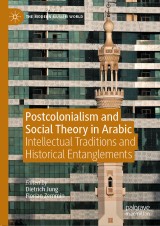Details

Postcolonialism and Social Theory in Arabic
Intellectual Traditions and Historical EntanglementsThe Modern Muslim World
|
CHF 142.00 |
|
| Verlag: | Palgrave Macmillan |
| Format: | |
| Veröffentl.: | 12.09.2024 |
| ISBN/EAN: | 9783031636493 |
| Sprache: | englisch |
| Anzahl Seiten: | 195 |
Dieses eBook enthält ein Wasserzeichen.
Beschreibungen
<p>Since Edward Said’s publication of <em>Orientalism</em> in 1978, so-called Western social theory and its claim to universal analytical validity has been exposed to severe criticism. Scholars from the field of postcolonial studies were most vocal in criticizing the Eurocentric nature of the conceptual apparatus of the social sciences. Indeed, contemporary social theory almost exclusively refers to the historical experiences of Western Europe and North America. Yet what is the alternative to these Eurocentric frameworks? Many postcolonial critics use very few non-English sources and tend to focus on the deconstruction of European and American theories.</p>
<p>The chapters of this volume provide a turn of perspective. The authors critically reflect upon the concepts of so-called Western social theory by engaging with social science literature and social theory in Arabic. Questions addressed include: What are the concepts, themes, and historical narratives in contemporary Arabic social theory? In which ways do Arab social theorists provide us with alternatives to the conceptual apparatuses employed by so-called Western social theory? To what extent are Arab and Western social theories entangled with each other?</p>
<p>The chapters of this volume provide a turn of perspective. The authors critically reflect upon the concepts of so-called Western social theory by engaging with social science literature and social theory in Arabic. Questions addressed include: What are the concepts, themes, and historical narratives in contemporary Arabic social theory? In which ways do Arab social theorists provide us with alternatives to the conceptual apparatuses employed by so-called Western social theory? To what extent are Arab and Western social theories entangled with each other?</p>
<p>Chapter 1: Beyond Deconstruction – An Introduction To Writing Social Theory In Arabic.- Part I: Social theory in Academic disciplines.- Chapter 2: (Post-)Colonialism, Authoritarianism, And Authenticity: Sociology In Arab Countries.- Chapter : Who Counts As A Theorist? Locating Maghrebi Sociologists In The Intellectual History Of Decolonization.- Chapter 4: Decentering First World War History: Arabic Perspectives On A Global Event.- Chapter 5: The Islamization Of Knowledge: Critique And Alternative.- Part II: Social theory Beyond Academic Disciplines.- Chapter 6: Liquid Modernity In Arabic.- Chapter 7: Crisis And Creativity: Tradition And Revolution In Arab Social Theory.- Chapter 8: The Road Out Of Marxism: Entangled Thought In 1970s Lebanon.- Chapter 9: Arabic Social Theory In Japanese And Indonesian: Transregional Ideoscapes Of The Long 1960s.</p>
<p><strong>Dietrich Jung</strong> is a professor in Middle East and Islamic studies at the University of Southern Denmark in Odense, Denmark.</p>
<p> </p>
<p><strong>Florian Zemmin</strong> is a professor of Islamic studies at Freie Universität in Berlin, Germany.</p>
<p> </p>
<p><strong>Florian Zemmin</strong> is a professor of Islamic studies at Freie Universität in Berlin, Germany.</p>
<p>Since Edward Said’s publication of <em>Orientalism </em>in 1978, so-called Western social theory and its claim to universal analytical validity has been exposed to severe criticism, and rightfully so. Scholars from the field of postcolonial studies were most vocal in criticizing the Eurocentric nature of the conceptual apparatus of the social sciences. Indeed, contemporary social theory almost exclusively refers to the historical experiences of Western Europe and North America. Yet what is the alternative to these Eurocentric frameworks? Many postcolonial critics use few non-English sources and tend to focus on the deconstruction of European and American theories.</p>
<p> </p>
<p>This book provides a turn of perspective. The authors critically reflect upon the concepts of so-called Western social theory by engaging with social theory in Arabic. Questions addressed include: What are the concepts, themes, and historical narratives in contemporary Arabic social theory? In which ways do Arab social theorists provide us with alternatives to the conceptual apparatuses employed by so-called Western social theory? To what extent are Arab and Western social theories entangled with each other?</p>
<p> </p>
<p><strong>Dietrich Jung </strong>is a professor in Middle East and Islamic studies at the University of Southern Denmark in Odense, Denmark.</p>
<p> </p>
<p><strong>Florian Zemmin </strong>is a professor of Islamic studies at Freie Universität Berlin, Germany.</p>
<p> </p>
<p>This book provides a turn of perspective. The authors critically reflect upon the concepts of so-called Western social theory by engaging with social theory in Arabic. Questions addressed include: What are the concepts, themes, and historical narratives in contemporary Arabic social theory? In which ways do Arab social theorists provide us with alternatives to the conceptual apparatuses employed by so-called Western social theory? To what extent are Arab and Western social theories entangled with each other?</p>
<p> </p>
<p><strong>Dietrich Jung </strong>is a professor in Middle East and Islamic studies at the University of Southern Denmark in Odense, Denmark.</p>
<p> </p>
<p><strong>Florian Zemmin </strong>is a professor of Islamic studies at Freie Universität Berlin, Germany.</p>
Offers unique insights into social theory debates in Arabic Succeeds beyond deconstruction of Western thought in highlighting its entanglements with non-Western thought Represents one of the very few books to make such discourse in Arabic accessible to non-Arabic readers
Diese Produkte könnten Sie auch interessieren:

Staat ohne Verantwortung?

von: Ludger Heidbrink, Alfred Hirsch, Simon Critchley, Pascal Delhom, Nancy Fraser, Volker Gerhardt, Christoph Hubig, Wolfgang Kersting, Helmut Klages, Tobias Nikolaus Klass, Werner Krawietz, Karl Heinz Ladeur, Renate Mayntz, Richard Münch, Julian Nida-Rümelin, Emmanuel Richter, Gunnar Folke Schuppert, Robert Spaemann, Werner Stegmaier, Michel Vanni

CHF 40.00
















